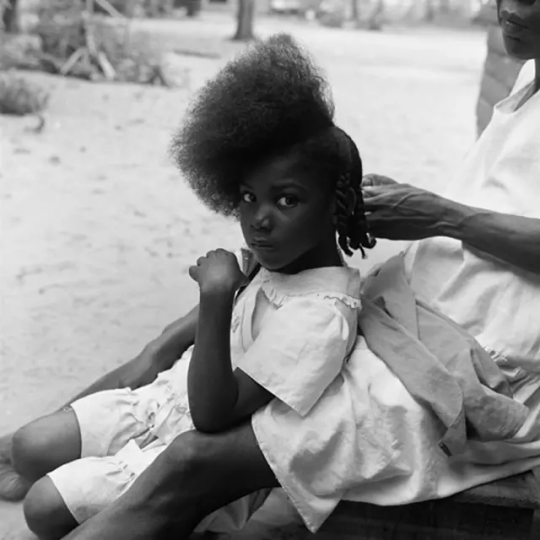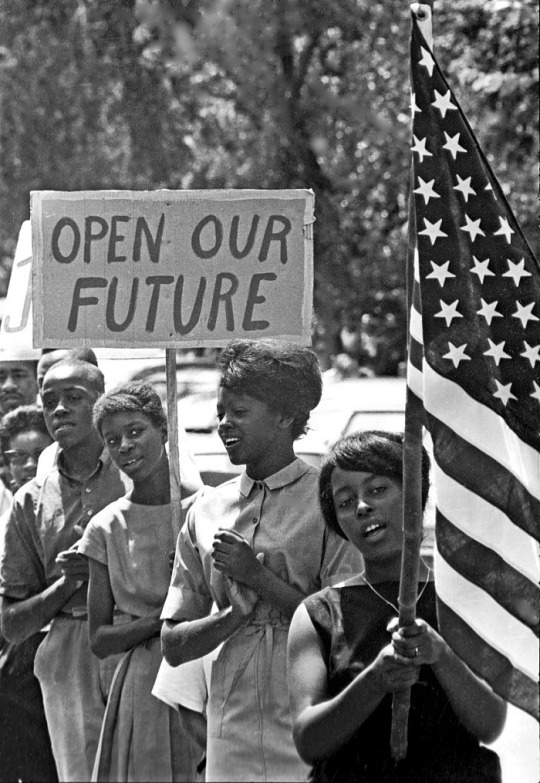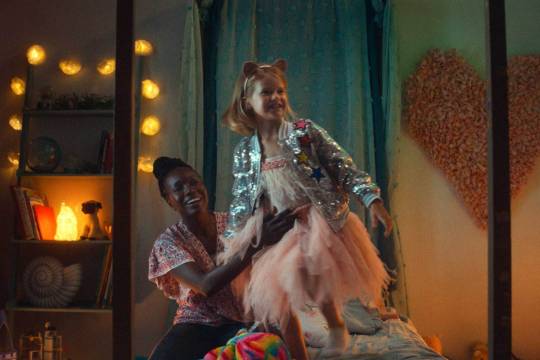Text
Entry 3: The African Woman Archive (Social Media)
The African Woman Archive is a research and online repository based in Ghana, dedicated to documenting historical images and works of black women across the African diaspora. By showcasing historical images and works of black women across different cultures, it emphasizes the multifaceted nature of the African diaspora and underscores the fact that black women's experiences are not monolithic.

"Honduras, Untitled Triunfo," 1992, "Africa's Legacy in Central America" Photographed by Tony Gleaton, Smithsonian America Art Museum
Race is a social construct that categorizes people based on physical attributes, such as skin color, hair texture, and facial features. Racial categorizations are not grounded in biological reality but are instead products of historical, social, and cultural factors that have been used to classify and differentiate human populations. (Sesardic) In the context of the African diaspora, "black" is a racial category that encompasses people with African ancestry. However, it's crucial to recognize that race is not a determinant of culture. People who are categorized as “Black” can belong to a wide variety of cultural backgrounds and traditions.

"July 4 March through Chapel Hill," 1964, James H Wallace
Collection of the Smithsonian National Museum of African American History and Culture
Race and skin color are often mistakenly conflated with culture, but they are distinct concepts. It's essential to understand the differences between these terms to avoid perpetuating stereotypes. Through this curated collection, the archive not only highlights the richness of African culture but also the ways in which it has evolved and adapted in different regions over time. This representation of diverse cultures helps break down stereotypes and misconceptions about the experiences of black women and fosters a deeper understanding of their historical significance.
Multiculturalism is the recognition and appreciation of different cultural backgrounds, promoting coexistence and understanding among diverse groups. The African Woman Archive contributes to multiculturalism by fostering a deeper understanding of the shared experiences and distinctiveness of black women from different cultures. It encourages people from various backgrounds to engage with each other's histories and celebrate their shared heritage.
3 notes
·
View notes
Text
Entry 2: Nanny (Film)
youtube
Featurette, Nanny (2022), Amazon Prime Video
Nanny, a psychological horror film by Niakyatu Jusu, “explores the American dream but is specific to the African immigrant experience. The main character, Aisha, played by Anna Diop, takes a job as a nanny for a white family. Her main goal is to make enough money to bring her son who she longs for, to America, from her homeland of Senegal. As she immerses herself in her role as a nanny, Aisha is met with both subtle and overt manifestations of cultural differences. Niakyatu Jusu masterfully weaves the theme of multiculturalism throughout the film, using everyday interactions to portray the complexities and challenges faced by immigrants in America.

Anna Diop and Rose Decker, Nanny (2022), Amazon Prime Video
The white family she works for, the Harrisons, are portrayed as well-meaning but oftentimes often have ignorant attitudes that some white families may have towards their immigrants. Their interactions with Aisha highlight the underlying cultural gaps and misconceptions that can arise between people of different backgrounds, sparking moments of discomfort and palpable tension. As Aisha forms a bond with the Harrison child she cares for, Aisha and Amy, the child’s mother, begin to clash.
"Spicy Food," Nanny (2022), Amazon Prime Video
African folklore is a diverse and vast collection of myths, legends, and traditional stories passed down through generations in various African societies. It often encompasses spirits, deities, magical creatures, and tales of good versus evil. By incorporating these elements into the film, Jusu not only pays homage to her cultural heritage but also creates a unique and immersive cinematic experience.

In the film, Aisha is haunted and beckoned by the deity, Mami Wata. Often she is drawn to bodies of water and has nightmares of drowning. In African traditions, Mami Wata is often depicted as a mermaid or a water spirit, with a combination of human and aquatic features. She may be portrayed with long flowing hair, a half-human, half-fish body, and often holding objects like a mirror, comb, or serpent. Mami Wata's origins can be traced back to pre-colonial times when indigenous African religious beliefs were prominent. Over the years, with the transatlantic slave trade and the spread of African diasporic cultures, her worship and veneration evolved and adapted in different regions, including the Americas and the Caribbean. (Drewal, 2008)
Drewal, Henry John. (2008). Mami Wata: Africa's Ancient God/dess Unveiled. University of California Press.

Aisha in Pool, Nanny (2022), Amazon Prime Video
Both Mami Wata's story and Aisha's story delve into the complexities of identity, cultural adaptation, and the intertwining of the spiritual and material aspects of life. As Aisha grapples with her past, her present, and her aspirations for the future, the film "Nanny" weaves a tale that resonates with the themes present in the worship and symbolism of Mami Wata.
1 note
·
View note
Text
Entry 1: Sense8 (TV)
youtube
Sense8 is an original Netflix series that tells the story of 8 strangers, from 8 countries around the world who become telepathically connected. They grapple with understating their newfound connection while also navigating the challenges of their day-to-day lives. The series is unique because each character's background and experiences vary across culture, race, ethnicity, gender, and sexuality.
Nomi, a woman of trans experience in a lesbian relationship, her girlfriend is a woman of color, struggles with acceptance from her family. There is Sun, a South Korean business executive who defies the misogyny of the men who run her family business and is also a kickboxer. Lito, a Mexican actor who struggles with coming out as gay in a society that expects him to conform to traditional masculine ideals.

Freema Agyeman and Jamie Clayton in Sense8 (2015) Photo retrieved from IMDB.com
Capheus, a driver from Nairobi, Kenya, who embodies the spirit of resilience and optimism as he navigates the challenging realities of his country. Kala, a pharmacist from Mumbai, India, grapples with societal expectations and her own desires. Wolfgang, a skilled thief from Berlin, Germany, brings a touch of edginess to the group with his troubled past and sharp instincts. Riley, an Icelandic DJ living in London, UK, carries a heavy emotional burden, seeks solace in music and finds unexpected connections with her newfound cluster of Sensates. Completing the group is Will, a Chicago police officer with a strong sense of justice and loyalty.

Sense 8 Cast, Netflix, 2015
As the Sensates navigate their interconnected lives, they share not only their thoughts and emotions but also their skills, knowledge, and strengths. Together, they learn to harness their collective power, forming a bond that transcends borders, cultures, and differences. Through their shared experiences, they challenge societal norms, fight against oppression, and embrace their individuality.
Sense8 raises awareness of the complexities and challenges faced by marginalized communities. It promotes a more nuanced understanding of the ways in which systems of oppression and privilege intersect and impact individuals' lives. The show emphasizes the importance of empathy, solidarity, and fighting for social justice across these intersecting identities.
Sense8, first streaming in 2015, was the first show I watched as a teenager that showcased a multicultural cast in a comprehensive and entertaining way. It opened my eyes to the power of storytelling and the importance of representation. Seeing characters from different backgrounds, races, genders, sexualities, and cultures coming together and supporting each other created a sense of belonging and empowerment within me.
2 notes
·
View notes